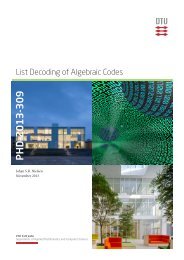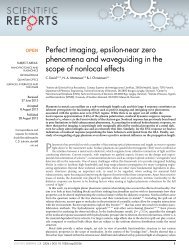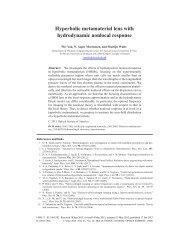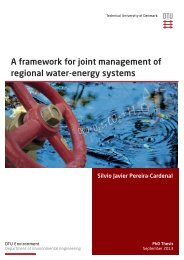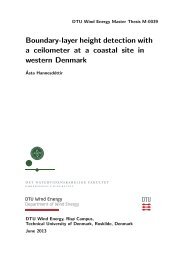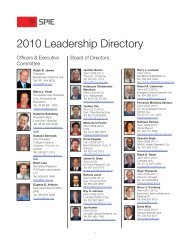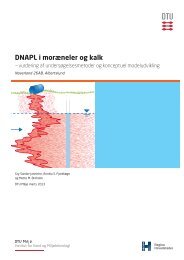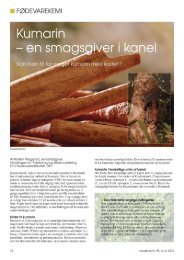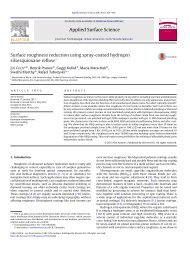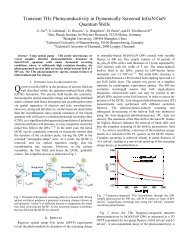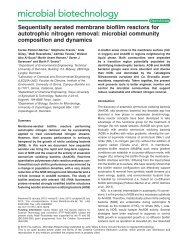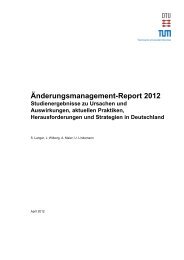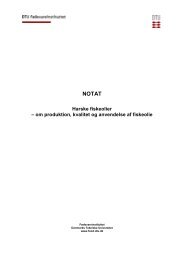PEC12-25 CAPEC-PROCESS Industrial Consortium ... - DTU Orbit
PEC12-25 CAPEC-PROCESS Industrial Consortium ... - DTU Orbit
PEC12-25 CAPEC-PROCESS Industrial Consortium ... - DTU Orbit
Create successful ePaper yourself
Turn your PDF publications into a flip-book with our unique Google optimized e-Paper software.
Larissa P Cunico (LACU)<br />
<strong>CAPEC</strong><br />
Marina Fedorova (MFAD)<br />
<strong>CAPEC</strong><br />
Modelling of phase equilibria and related properties of<br />
mixtures involving lipids<br />
The objective of this project is to perform a systematic<br />
numerical analysis to determine the needs of phase equilibria<br />
and related properties in the production of edible oils, biodiesel<br />
and other oleochemicals. The available data in literature will be<br />
analyzed for consistency and then used to develop/adopt the<br />
most appropriate models, for example, group-contribution<br />
combined with atom connectivity based models. For systems<br />
that are not in literature, some experimental work will be<br />
conducted in UNICAMP – Department artment of Chemical<br />
Engineering in Brazil, where the necessary facilities exist. These<br />
developed predictive models will be used to determine the<br />
sensitivity of design variables with respect to uuncertainties<br />
in the<br />
predicted properties. The application of the he developed properties<br />
models will be illustrated through case studies involving<br />
different lipid compound processing steps. Then, the obtained<br />
results will be implemented in process simulation software and<br />
will be applied on industrial cases from Alfa Lav Laval Copenhagen<br />
A/S as one of the means to validate the models.<br />
Supervisors: RaG, Prof R. Cerriani, Dr. B Sarup<br />
Start: 1-3-2012; End: 28-2-2015<br />
Research areas: A, F<br />
Systematic methods and tools for computer aided modelling<br />
Models play an important role of increasing importance in<br />
design and analysis of chemicals/bio-chemicals chemicals based products<br />
and the processes that manufacture them because of the<br />
increasing use of computer-aided aided methods and tools. The<br />
advantage of using these model-based based methods and tools is that<br />
they have the potential to reduce the number of experiments,<br />
which can be expensive and time consuming. As the required<br />
models may be complex and require multiple time and/or<br />
lengths scales, their development and app application for productprocess<br />
design is not trivial. Therefore, the modelling<br />
framework can contribute by reducing the time and resources<br />
needed for model development and application, thereby<br />
reducing the overall time and cost for product product-process<br />
development<br />
The objective of this project is to develop methods and tools that<br />
will allow systematic development of models and their solution<br />
using a modelling framework, which consists of a model<br />
generation tool, a model analysis-solution solution tool and templates for<br />
solving ving different modelling problems. Through a number of<br />
modelling case studies, the novel features of the modelling<br />
framework will be illustrated.<br />
Supervisors: RaG, GSI<br />
Start: 1-4-2012; End: 31-3-2015<br />
Research areas: B, E, F<br />
32



